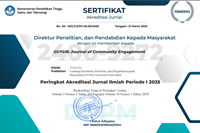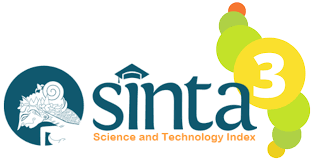Adderley, R. J., Hope, M. A., Hughes, G. C., Jones, L., Messiou, K., & Shaw, P. A. (2015). Exploring inclusive practices in primary schools: focusing on children’s voices. European Journal of Special Needs Education, 30(1), 106–121. https://doi.org/10.1080/08856257.2014.964580
Anastasiou, D., Kauffman, J. M., & Di Nuovo, S. (2015). Inclusive education in Italy: description and reflections on full inclusion. European Journal of Special Needs Education, 30(4), 429–443. https://doi.org/10.1080/08856257.2015.1060075
Bai, G. N., Wang, Y. F., Yang, L., & Niu, W. Y. (2015). Effectiveness of a focused, brief psychoeducation program for parents of ADHD children: Improvement of medication adherence and symptoms. Neuropsychiatric Disease and Treatment, 11, 2721–2735. https://doi.org/10.2147/NDT.S88625
Barida, M., & Muarifah, A. (2019). Assessment Implementation to Detect Children with Special Needs in Inclusive School.
Budiarti, N. D., & Sugito, S. (2018). Implementation of Inclusive Education of Elementary Schools: a Case Study in Karangmojo Sub-District, Gunungkidul Regency. Journal of Education and Learning (EduLearn), 12(2), 214–223. https://doi.org/10.11591/edulearn.v12i2.8727
Crispel, O., & Kasperski, R. (2021). The impact of teacher training in special education on the implementation of inclusion in mainstream classrooms. International Journal of Inclusive Education, 25(9), 1079–1090. https://doi.org/10.1080/13603116.2019.1600590
De, O., & Sostenible, D. (2017). Guía para asegurar la inclusión y la equidad en la educación. www.unesco.org/
Direktorat Pendidikan Masyarakat dan Pendidikan Khusus. (2021). Instrumen_PBS_Edisi_2021_Final.
Efendi, M., Pradipta, R. F., Dewantoro, D. A., Ummah, U. S., Ediyanto, E., & Yasin, M. H. M. (2022). Inclusive Education for Student with Special Needs at Indonesian Public Schools. International Journal of Instruction, 15(2), 967–980. https://doi.org/10.29333/iji.2022.15253a
Efthymiou, E., & Kington, A. (2017). The development of inclusive learning relationships in mainstream settings: A multimodal perspective. Dalam Cogent Education (Vol. 4, Nomor 1). Taylor and Francis Ltd. https://doi.org/10.1080/2331186X.2017.1304015
Eklund, G., Sundqvist, C., Lindell, M., & Toppinen, H. (2020). A study of Finnish primary school teachers’ experiences of their role and competences by implementing the three-tiered support. European Journal of Special Needs Education, 1–14. https://doi.org/10.1080/08856257.2020.1790885
Elton-Chalcraft, S., Cammack, P. J., & Harrison, L. (2016). Segregation, integration, inclusion and effective provision: a case study of perspectives from special educational needs children, parents and teachers in Bangalore, India. International Journal of Special Education.
Kusmaryono, I. (2023). Faktor berpengaruh, tantangan, dan kebutuhan guru di sekolah inklusi di Kota Semarang. Jurnal Ilmiah Pendidikan Dasar, 10(1), 12. https://doi.org/10.30659/pendas.10.1.12-23
Lindner, K. T., Alnahdi, G. H., Wahl, S., & Schwab, S. (2019). Perceived differentiation and personalization teaching approaches in inclusive classrooms: Perspectives of students and teachers. Frontiers in Education, 4. https://doi.org/10.3389/feduc.2019.00058
Maureen, P., & Tanyi, E. (2016). Journal of Education and Practice www.iiste.org ISSN (Vol. 7, Nomor 18). Online. www.iiste.org
Mufidah, Y., Hamdian Affandi, L., & Ermiana, I. (2021). IDENTIFIKASI TANTANGAN YANG DIHADAPI GURU DALAM IMPLEMENTASI PENDIDIKAN INKLUSIF DI SEKOLAH DASAR NEGERI 1 GEMEL DAN SEKOLAH DASAR NEGERI BATUTULIS. 1(1).
Paseka, A., & Schwab, S. (2020). Parents’ attitudes towards inclusive education and their perceptions of inclusive teaching practices and resources. European Journal of Special Needs Education, 35(2), 254–272. https://doi.org/10.1080/08856257.2019.1665232
Peraturan Walikota Surabaya Nomor 52 Tahun 2022 Tentang Pedoman Penyelenggaraan Pendidikan Inklusif di Kota Surabaya.
Purri, M. A., Andini, Tunnur, U. Z., & Andriani, O. (2024). Tantangan Anak Berkebutuhan Khusus (ABK) Dalam Menjalankan Pendidikan Inklusi di Tingkat Sekolah Dasar. Bahasa dan Ilmu Sosial, 2(2), 146–161. https://doi.org/10.61132/nakula.v2i2.581
Sagun, K., Albarillo, A., Amancio, J. K., Bulanadi, J., De Guzman, I., Jugueta, V. P., & Santos, K. E. (2022). Outcomes of Early Detection and Intervention of Children with Disability: Perspectives from Philippine Public School Teachers and Administrators. International Journal of Disability, Development and Education, 69(4), 1151–1167. https://doi.org/10.1080/1034912X.2020.1761539
Saloviita, T. (2020). Attitudes of Teachers Towards Inclusive Education in Finland. Scandinavian Journal of Educational Research, 64(2), 270–282. https://doi.org/10.1080/00313831.2018.1541819
Sánchez, P. A., Rodríguez, R. de H., & Martínez, R. M. M. (2019). Barriers to student learning and participation in an inclusive school as perceived by future education professionals. Journal of New Approaches in Educational Research, 8(1), 18–24. https://doi.org/10.7821/naer.2019.1.321
Shevchenko, Y. M., Dubiaha, S. M., Melash, V. D., Fefilova, T. V., & Saenko, Y. (2020). The role of teachers in the organization of inclusive education of primary school pupils. International Journal of Higher
Education, 9(7), 207–216. https://doi.org/10.5430/ijhe.v9n7p207
Srivastava, M., de Boer, A. A., & Pijl, S. J. (2017). Preparing for the inclusive classroom: changing teachers’ attitudes and knowledge. Teacher Development, 21(4), 561–579. https://doi.org/10.1080/13664530.2017.1279681
Tartono, N. (2016). Permasalahan-permasalahan yang dihadapi sekolah penyelenggara pendidikan inklusi pada tingkat SD. HUMANITAS, 13, 50–61. https://doi.org/10.26555/humanitas.v13i1.3843
 (Universitas Airlangga)
(Universitas Airlangga) 









.png)
